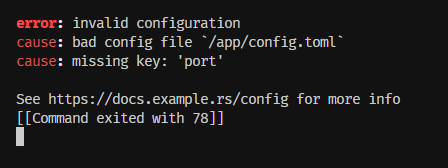9 releases
| 0.4.2 | Jul 12, 2024 |
|---|---|
| 0.4.1 | Jun 8, 2023 |
| 0.4.0 | Nov 24, 2022 |
| 0.3.0 | Oct 19, 2022 |
| 0.1.3 | Sep 28, 2022 |
#125 in Command-line interface
60KB
717 lines
narrate
This library provides CLI application error and status reporting utilities. The coloured output formatting aims to be similar to Cargo. Error type is a wrapper around anyhow, with optional help messages.
Features
- User facing status messages and error reporting
- Wrap any error with additional context
- Optional help messages for errors
- Set of standard CLI errors with exit codes conforming to sysexits.h
- Convenience
Resulttype - Replace/integrate with anyhow
How to use
-
Use
narrate::Result<T>as a return type of any fallible function.Within the function, use
?to propagate any error that implements thestd::error::Errortrait. Same asanyhow::Result<T>.use narrate::Result; fn get_user() -> Result<User> { let json = std::fs::read_to_string("user.json")?; let user: User = serde_json::from_str(&json)?; Ok(user) } -
Wrap an error with more context by importing the
narrate::ErrorWraptrait. Similar toanyhow::Context, this can give your users more information as to why an error happened.use narrate::{CliError, ErrorWrap, Result}; fn run() -> Result<()> { ... // wrap with contextual information data.acquire().wrap("unable to acquire data")?; // wrap with another error config.load().wrap(CliError::Config)?; // wrap with lazily evaulated string or error config.load().wrap_with(|| format!("cannot load {}", path))?; // wrap with help information create_dir() .wrap("project directory already exists") .add_help("Try using cargo init")?; ... }error: project directory already exists cause: Is a directory (os error 20) Try using cargo init -
Use the
narrate::ExitCodetrait to get the sysexits.h conforming exit code from anarrate::Error. By default this is just70 (software error), but using an apropriateCliErrorwill change this. -
narrate::CliErrorcollection of typical command line errors. Use them to add context to deeper application errors. Use theirexit_codeto conform to sysexits.h.use narrate::{CliError, ErrorWrap, ExitCode, Result}; fn main() { let res = run(); if let Err(ref err) = res { std::process::exit(err.exit_code()); } } fn run() -> Result<()> { will_error().wrap(CliError::OsErr)? Ok(()) } -
Report errors to the command line with either
report::errorreport::err_fullfor the complete error chain.use narrate::{CliError, Error, report}; fn main() { let res = run(); if let Err(ref err) = res { report::err_full(&err); std::process::exit(err.exit_code()); } } fn run() -> Result<()> { ... let config: Config = serde_json::from_str(&json) .wrap("bad config file `/app/config.toml`") .wrap(CliError::Config) .add_help("see https://docs.example.rs/config for more help")?; ... }
-
Report application status to the command line with
report::status. Modeled on the output from Cargo.use narrate::{Color, report}; fn main() { report::status("Created", "new project `spacetime`", Color::Green); }
Please view the API Docs and examples for more information.
FAQ
Should I use narrate instead of anyhow or eyre?
Anyhow is a great tool for handling errors in your CLI app, but it doesn't come with its own reporting, common set of errors, or the ability to add separate help messages.
Eyre and its companion crates offer fine-grained error reporting and is far more customizable than narrate - which is opinionated in copying Cargo's style. If you don't need that much control, narrate provides a simpler alternative. Plus the added benefit of reporting statuses, not just errors.
Can I just pretty print my anyhow errors?
If you just use the report
Cargo feature flag,
you can access the report
module and thus the anyhow_err and anyhow_err_full functions.
# Cargo.toml
[dependencies]
narrate = { version = "0.4.2", default-features = false, features = ["report"] }
// main.rs
use narrate::report;
fn main() {
if let Err(err) => run() {
report::anyhow_err_full(err);
}
}
fn run() -> anyhow::Result<()> {
...
}
Contributing
Thank you very much for considering to contribute to this project!
We welcome any form of contribution:
- New issues (feature requests, bug reports, questions, ideas, ...)
- Pull requests (documentation improvements, code improvements, new features, ...)
Note: Before you take the time to open a pull request, please open an issue first.
See CONTRIBUTING.md for details.
License
narrate is distributed under the terms of both the MIT license and the Apache License (Version 2.0).
See LICENSE-APACHE and LICENSE-MIT for details.
Dependencies
~0–6.5MB
~30K SLoC